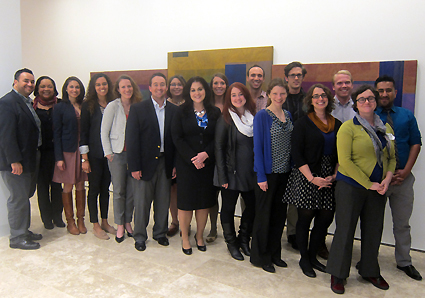The APAGS Committee has proposed an APA Bylaws and Rules change that will allow for graduate student affiliate members of APA to vote in elections for the President-elect and Members of the Board of Directors, along with bylaws amendments and the distribution of seats on the APA Council of Representatives.
The APAGS Committee is bringing this proposal to Boards and Committees of APA this fall, and to the Board of Directors and the Council of Representatives next year. If the change is approved by Council, and then by the current voting members of APA, approximately 21,000 graduate student members of APA could be eligible to vote in 2020 and beyond.
We asked the five members currently running for APA President-elect the following question:
“Should APA Graduate Student members be given the privilege to vote on all association matters within APA after one year of membership?”
Here’s how they responded. You can learn more about the candidates here.
 Armand R. Cerbone, PhD
Armand R. Cerbone, PhD
“I strongly support APAGS in seeking voting privileges. Having organized graduate representation within my department, I know the importance of enfranchising graduate voices. As a faculty member introducing a course on homosexuality in 1983, I recruited at my expense a lesbian student to co-teach because we both understood I could not appropriately represent the experience of queer women. While the future affects all psychologists, it affects psychology students most. My campaign is about the future of psychology even more than our past. I will seek the critical input of APAGS in developing a 25/50-year vision plan for psychology.”
 Jean Lau Chin, EdD
Jean Lau Chin, EdD
“Graduate students make up a significant portion of our APA membership. They should have a voice because they are the future of our profession. As APAGS, they have already demonstrated that their participation in governance has been meaningful and relevant, and that they have been responsible in providing important input on association matters. We need to view the vibrancy of our profession and association as one where we seek and value the perspectives of members along the entire spectrum of their career. Hence, I support giving graduate students the privilege to vote on association matters including elections after one year of membership.”
 Steven D. Hollon, PhD
Steven D. Hollon, PhD
“APA is getting older and has trouble getting students to join and early career professionals to convert. The best way to excite new professionals entering the field is to give them the vote while they are still students and I would not make them wait the year. You join you vote. If we want students to invest in the discipline then we need to invest in them. We secure our future as an organization if we trust our future generations.”
 Sandra L. Shullman, PhD
Sandra L. Shullman, PhD
“Graduate students have an important voice to contribute to APA. I value their contributions and support their voting and representation. Voting is an opening invitation that can lead to greater engagement in APA, but we must couple voting with opportunities for leadership training/development; meaningful ways to give feedback to our discipline/profession; and encouragement to support/engage in advocacy, public policy and social justice initiatives. These experiences, along with the opportunity to vote, can build career-long engagement and commitment to APA’s future. As APA President, I would look forward to working with APAGS to turn this goal into successful action. www.SandyShullmanForAPAPresident.com #sandys4apaprez #sandy2020”
 Susan Krauss Whitbourne, PhD
Susan Krauss Whitbourne, PhD
“As a long-time supporter of the work of APAGS, I am in favor of the proposal to grant voting privileges to graduate students in APA-wide elections. This step would represent an important way to ensure that APA reflects the concerns of those who are entering our discipline and also to provide graduate students with a voice in the future of the association. One of the key components of my presidential platform is that APA needs to reflect the interests of early career psychologists, and therefore this proposal is consistent with my own priorities to keep the association vital and flourishing.”
We thank all candidates for their openness to this proposed seismic shift in APA.


 As the new
As the new  Transparency in government—in ensuring accountability, reducing barriers for involvement, and building institutional confidence—is perhaps one of the greatest assets a representative body can provide to its constituents. It can help ensure the dissemination of information, the empowerment of individuals to partake in their governing, and promote societal progress.
Transparency in government—in ensuring accountability, reducing barriers for involvement, and building institutional confidence—is perhaps one of the greatest assets a representative body can provide to its constituents. It can help ensure the dissemination of information, the empowerment of individuals to partake in their governing, and promote societal progress. It is indeed up to both our organization and to us, as members, to participate actively to promote institutional change. I strongly encourage you to peruse the documents listed on the page as a first step. If, in reading these sources, you’d like to get more involved in APAGS to ensure its success at all levels, please consider running for an
It is indeed up to both our organization and to us, as members, to participate actively to promote institutional change. I strongly encourage you to peruse the documents listed on the page as a first step. If, in reading these sources, you’d like to get more involved in APAGS to ensure its success at all levels, please consider running for an 